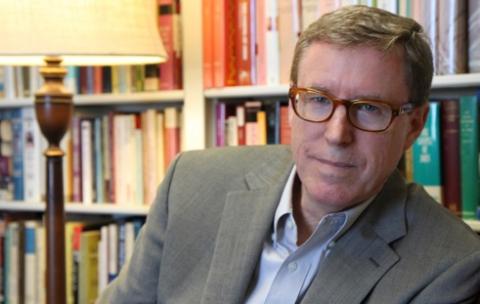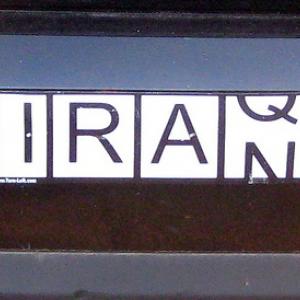
Gary M. Burge is a professor of New Testament at Calvin Theological Seminary in Grand Rapids, MI., and author of several books, including Jesus and the Land: The New Testament Challenge to "Holy Land" Theology.
Posts By This Author
An Appeal to the Center
IMAGINE A gathering of thoughtful American Christians, of diverse backgrounds—from Greek Orthodox to Pentecostal—and each with some experience of the conflict between the Israelis and Palestinians. If you could record their conversations, it might be the beginning of the book that is here before us.
A Land Full of God is an essay collection compiled by Mae Elise Cannon, executive director of Churches for Middle East Peace, to show a range of opinions about the Israel-Palestine conflict in the American church. The writers share a general understanding that peacemaking is the only way forward. Some admit they are exhausted by this conflict. Many express despair over the extremist voices that seem to push the U.S. church around. And a few have suggestions for what might make a difference.
In one of the book’s liveliest essays, Paul Alexander sums up key points: 1) Israel must end its military occupation of the Palestinians and be less violent. 2) Palestinians need to recognize the state of Israel and stop vilifying Jews. 3) Christians need to give a rest to appeals to eschatology in this entire mess. Alexander sounds exasperated and pragmatic, feelings many of us share.
If you’ve had much contact with this topic, it is impossible to read such a book with any neutrality.
Is Iran the New Iraq?

Iraq/Iran. Image via Wylio http://bit.ly/zQUiV7
It’s hard to remember the warm-up to the Iraq war now almost 10 years old. Following the devastating experience of 9/11 (Sept. 11, 2001), the United States experienced enormous national feelings of anger and sought a means to identify and punish those who were guilty of this horrendous act of terror. We now know that within days, the White House (in particular, the vice president’s office) was pointing a finger at Iraq and within 12 months, any observer could tell that we were on our way to war.
On March 19, 2003, when the invasion began I remember telling a class of students that they ought to remember this day well. It might be a war the U.S. would regret and it might lead to an involvement in the Middle East we don’t know how to end. Now ten years later we’re still mired over there.
What were the reasons for the war? Let’s make a list:
Newt Gingrich’s Middle East Blunder (Expect More)
Ridiculous. Ignorant. Racist. Dangerous.
These are just a few of the terms that flew out of the Middle East this weekend following Newt Gingrich’s unwelcome remarks about Israel and the Palestinians on Friday.
As the Republican front-runner, Gingrich was speaking to the cable TV Jewish Channel and hoping to curry favor with its conservative pro-Israel constituency.
What did he do? He described the Palestinians as an “invented people” and lumped every Palestinian under the terrorist umbrella. There is no difference between Hamas and the Palestinian Authority, he said.
On Saturday night during the ABC Republican debate, Gingrich doubled-down: “They [the Palestinians] are all terrorists.”
A few of the other candidates looked, well, alarmed.
Les Mis
I prefer my revolutions to be simple: A corrupt dictator/tyrant, an oppressed population, inspired reformers who risk their lives, calls for democracy, waves of marchers in the streets, background music from Les Misérables. The stories from Tunis and Cairo were epochal. The Arab spring was in full bloom as calls for participatory government could be heard from every corner of the Middle East.
Then there was Syria. The Assad government has been infamous in its intolerance to dissent. It is a military regime whose 30-year leadership under Hafez al-Assad (1930-2000) established it as one of the most severe in the region. In 2,000, after the death of Hafez, the world was intrigued to see his second son -- Bashar al-Assad -- ascend the throne. Bashar was an ophthalmologist who had studied in London, but because of his older brother's death in a car accident in 1994, he was called to follow his father. Bashar speaks English and French fluently and has been as critical of the U.S. as he has been of Israel.
A Gun, a Pause, and Innocence Lost in the West Bank
On Palestinians: Whose Narrative Wins?
Once again last week the pages of the New York Times was graced with an ad published by David Horowitz's Freedom Center, one of those websites you visit and immediately begin to rethink the sanity of published discourse on the Web.
Terry Jones, Burning a Quran, and Evangelicalism
It isn't as if the Middle East needed another complication. Tunisia, Egypt, Libya, Yemen -- now Terry Jones? Rev. Jones is a fringe pastor in Gainesville, Florida, who spent about 30 years as a missionary in Europe.
Five Frustrations When You Debate Israel and the Palestinians
I've been fascinated watching an earlier blog hunker down into a strong debate about Israel and the Palestinians (February 22, "
When Will 3.5 Million Palestinians Get Their Chance For Freedom?
Egypt's Power Vacuum
For an entire week now we've watched tens of thousands of Egyptians march demanding a change in government. The police force has collapsed. The army is out in force. Residents are policing their own neighborhoods. President Mubarak is weighing his options. And the West is wondering what will happen next.
Middle East Martyr-Christians
When is an Incentive a Bribe? Israel, Settlements, and Fighter Jets
Dialogue at the Demonstration: Risking Conversation with the Face of Occupation
Bethlehem, West Bank. Evangelicals have never been keen on political protests. Especially the sort that includes rifles and grenades -- in the hands of your opponents.
